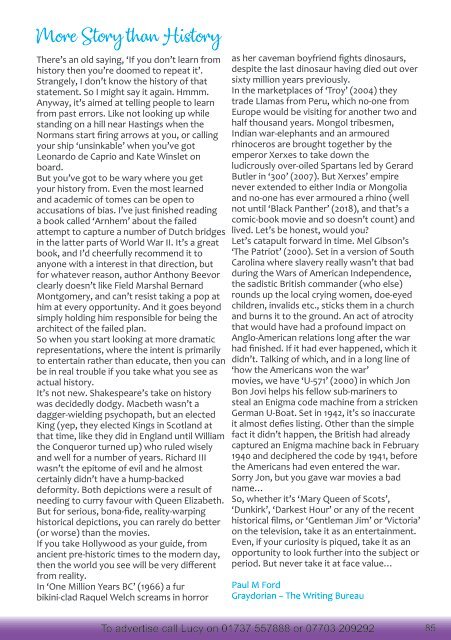CR5 Issue 169 June 2019
A local community magazine delivered free to 11,800 homes every month in the CR5 postcode. Contains local business advertising,interesting reads, Competitions, What's on in the Community and puzzles.
A local community magazine delivered free to 11,800 homes every month in the CR5 postcode.
Contains local business advertising,interesting reads, Competitions, What's on in the Community and puzzles.
You also want an ePaper? Increase the reach of your titles
YUMPU automatically turns print PDFs into web optimized ePapers that Google loves.
More Story than History<br />
There’s an old saying, ‘If you don’t learn from<br />
history then you’re doomed to repeat it’.<br />
Strangely, I don’t know the history of that<br />
statement. So I might say it again. Hmmm.<br />
Anyway, it’s aimed at telling people to learn<br />
from past errors. Like not looking up while<br />
standing on a hill near Hastings when the<br />
Normans start firing arrows at you, or calling<br />
your ship ‘unsinkable’ when you’ve got<br />
Leonardo de Caprio and Kate Winslet on<br />
board.<br />
But you’ve got to be wary where you get<br />
your history from. Even the most learned<br />
and academic of tomes can be open to<br />
accusations of bias. I’ve just finished reading<br />
a book called ‘Arnhem’ about the failed<br />
attempt to capture a number of Dutch bridges<br />
in the latter parts of World War II. It’s a great<br />
book, and I’d cheerfully recommend it to<br />
anyone with a interest in that direction, but<br />
for whatever reason, author Anthony Beevor<br />
clearly doesn’t like Field Marshal Bernard<br />
Montgomery, and can’t resist taking a pop at<br />
him at every opportunity. And it goes beyond<br />
simply holding him responsible for being the<br />
architect of the failed plan.<br />
So when you start looking at more dramatic<br />
representations, where the intent is primarily<br />
to entertain rather than educate, then you can<br />
be in real trouble if you take what you see as<br />
actual history.<br />
It’s not new. Shakespeare’s take on history<br />
was decidedly dodgy. Macbeth wasn’t a<br />
dagger-wielding psychopath, but an elected<br />
King (yep, they elected Kings in Scotland at<br />
that time, like they did in England until William<br />
the Conqueror turned up) who ruled wisely<br />
and well for a number of years. Richard III<br />
wasn’t the epitome of evil and he almost<br />
certainly didn’t have a hump-backed<br />
deformity. Both depictions were a result of<br />
needing to curry favour with Queen Elizabeth.<br />
But for serious, bona-fide, reality-warping<br />
historical depictions, you can rarely do better<br />
(or worse) than the movies.<br />
If you take Hollywood as your guide, from<br />
ancient pre-historic times to the modern day,<br />
then the world you see will be very different<br />
from reality.<br />
In ‘One Million Years BC’ (1966) a fur<br />
bikini-clad Raquel Welch screams in horror<br />
as her caveman boyfriend fights dinosaurs,<br />
despite the last dinosaur having died out over<br />
sixty million years previously.<br />
In the marketplaces of ‘Troy’ (2004) they<br />
trade Llamas from Peru, which no-one from<br />
Europe would be visiting for another two and<br />
half thousand years. Mongol tribesmen,<br />
Indian war-elephants and an armoured<br />
rhinoceros are brought together by the<br />
emperor Xerxes to take down the<br />
ludicrously over-oiled Spartans led by Gerard<br />
Butler in ‘300’ (2007). But Xerxes’ empire<br />
never extended to either India or Mongolia<br />
and no-one has ever armoured a rhino (well<br />
not until ‘Black Panther’ (2018), and that’s a<br />
comic-book movie and so doesn’t count) and<br />
lived. Let’s be honest, would you?<br />
Let’s catapult forward in time. Mel Gibson’s<br />
‘The Patriot’ (2000). Set in a version of South<br />
Carolina where slavery really wasn’t that bad<br />
during the Wars of American Independence,<br />
the sadistic British commander (who else)<br />
rounds up the local crying women, doe-eyed<br />
children, invalids etc., sticks them in a church<br />
and burns it to the ground. An act of atrocity<br />
that would have had a profound impact on<br />
Anglo-American relations long after the war<br />
had finished. If it had ever happened, which it<br />
didn’t. Talking of which, and in a long line of<br />
‘how the Americans won the war’<br />
movies, we have ‘U-571’ (2000) in which Jon<br />
Bon Jovi helps his fellow sub-mariners to<br />
steal an Enigma code machine from a stricken<br />
German U-Boat. Set in 1942, it’s so inaccurate<br />
it almost defies listing. Other than the simple<br />
fact it didn’t happen, the British had already<br />
captured an Enigma machine back in February<br />
1940 and deciphered the code by 1941, before<br />
the Americans had even entered the war.<br />
Sorry Jon, but you gave war movies a bad<br />
name…<br />
So, whether it’s ‘Mary Queen of Scots’,<br />
‘Dunkirk’, ‘Darkest Hour’ or any of the recent<br />
historical films, or ‘Gentleman Jim’ or ‘Victoria’<br />
on the television, take it as an entertainment.<br />
Even, if your curiosity is piqued, take it as an<br />
opportunity to look further into the subject or<br />
period. But never take it at face value…<br />
Paul M Ford<br />
Graydorian – The Writing Bureau<br />
To advertise call Lucy on 01737 557888 or 07703 209292<br />
85
















